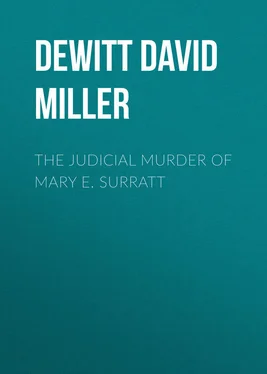David DeWitt - The Judicial Murder of Mary E. Surratt
Здесь есть возможность читать онлайн «David DeWitt - The Judicial Murder of Mary E. Surratt» — ознакомительный отрывок электронной книги совершенно бесплатно, а после прочтения отрывка купить полную версию. В некоторых случаях можно слушать аудио, скачать через торрент в формате fb2 и присутствует краткое содержание. Жанр: foreign_antique, foreign_prose, на английском языке. Описание произведения, (предисловие) а так же отзывы посетителей доступны на портале библиотеки ЛибКат.
- Название:The Judicial Murder of Mary E. Surratt
- Автор:
- Жанр:
- Год:неизвестен
- ISBN:нет данных
- Рейтинг книги:5 / 5. Голосов: 1
-
Избранное:Добавить в избранное
- Отзывы:
-
Ваша оценка:
- 100
- 1
- 2
- 3
- 4
- 5
The Judicial Murder of Mary E. Surratt: краткое содержание, описание и аннотация
Предлагаем к чтению аннотацию, описание, краткое содержание или предисловие (зависит от того, что написал сам автор книги «The Judicial Murder of Mary E. Surratt»). Если вы не нашли необходимую информацию о книге — напишите в комментариях, мы постараемся отыскать её.
The Judicial Murder of Mary E. Surratt — читать онлайн ознакомительный отрывок
Ниже представлен текст книги, разбитый по страницам. Система сохранения места последней прочитанной страницы, позволяет с удобством читать онлайн бесплатно книгу «The Judicial Murder of Mary E. Surratt», без необходимости каждый раз заново искать на чём Вы остановились. Поставьте закладку, и сможете в любой момент перейти на страницу, на которой закончили чтение.
Интервал:
Закладка:
The following colloquy then took place:
“Mr. Johnson. – May I ask who the member of the Court is that makes that objection?
“The President. – Yes, sir, it is General Harris, and, if he had not made it, I should have made it myself.
“Mr. Johnson. – I do not object to it at all. The Court will decide if I am to be tried.
“The President. – The Court will be cleared.
“Mr. Johnson. – I hope I shall be heard.
“General Ekin. – I think it can be decided without clearing the Court.
“General Wallace. – I move that Mr. Johnson be heard.
“The President and others. – Certainly.
“Mr. Johnson. – Is the opinion here to which the objection refers?
“The President. – I think it is not.”
It was discovered, farther on, that General Harris by his own admissions had not even seen the opinion since he had read it a year ago, and that his objection, involving so grave an attack upon the moral character of so distinguished a man, was based upon a mere recollection of its contents after that lapse of time.
Naturally, the gray-haired statesman and lawyer was indignant at this premeditated insult. In his address to the Court he repudiated with scorn the interpretation put upon his letter by his accuser. He explained the circumstances under which the opinion was delivered; that the Maryland Convention had prescribed an oath to the voter which they had no right to exact; “and all that the opinion said, or was intended to say, was, that to take the oath voluntarily was not a craven submission to usurped authority, but was necessary in order to enable the citizen to protect his rights under the then constitution; and that there was no moral harm in taking an oath which the Convention had no authority to impose.”
Among other things he said:
“There is no member of this Court, including the President, and the member that objects, who recognizes the obligation of an oath more absolutely than I do; and there is nothing in my life, from its commencement to the present time, which would induce me for a moment to avoid a comparison in all moral respects between myself and any member of this Court.
“If such an objection was made in the Senate of the United States, where I am known, I forbear to say how it would be treated.
“I have lived too long, gone through too many trials, rendered the country such services as my abilities enabled me, and the confidence of the people in whose midst I am has given me the opportunity, to tolerate for a moment – come from whom it may – such an aspersion upon my moral character. I am glad it is made now, when I have arrived at that period of life when it would be unfit to notice it in any other way.
“I am here at the instance of that lady (pointing to Mrs. Surratt) whom I never saw until yesterday, and never heard of, she being a Maryland lady; and thinking that I could be of service to her, and protesting as she has done her innocence to me – of the facts I know nothing – because I deemed it right, I deemed it due to the character of the profession to which I belong, and which is not inferior to the noble profession of which you are members, that she should not go undefended. I knew I was to do it voluntarily, without compensation; the law prohibits me from receiving compensation; but if it did not, understanding her condition, I should never have dreamed of refusing upon the ground of her inability to make compensation.”
General Harris, in reply, insisted that the remarks of Mr. Johnson, explanatory of the letter, corroborated his construction. “I understand him to say that the doctrine which he taught the people of his state was, that because the Convention had framed an oath, which was unconstitutional and illegal in his opinion, therefore it had no moral binding force, and that people might take it and then go and vote without any regard to the subject matter, of the oath.”
Mr. Johnson, interrupting, denied having said any such thing. General Hunter, thereupon, to help his colleague out, had the remarks read from the record. Mr. Johnson assenting to the correctness of the report, General Harris continued: “If that language does not justify my conclusion, I confess I am unable to understand the English language;” and then repeated his construction of the letter.
After he had concluded, Mr. Johnson endeavored to show the author of “Calvinism Vindicated” that he did not understand the English language, by pointing out the distinction between stating “there was no harm in taking an oath, and telling the people of Maryland that there would be no harm in breaking it after it was taken.” Again repelling the misconstruction attempted to be put upon his words, he proceeded to open a new line as follows:
“But, as a legal question, it is something new to me that the objection, if it was well founded in fact is well founded in law. Who gives to the Court the jurisdiction to decide upon the moral character of the counsel who may appear before them? Who makes them the arbiters of the public morality and professional morality? What authority have they, under their commission, to rule me out, or to rule any other counsel out, upon the ground, above all, that he does not recognize the validity of an oath, even if they believed it?”
General Harris, in rejoinder, stated that under the rules adopted by the Commission gentlemen appearing as counsel for the accused must either produce a certificate of having taken the oath of loyalty or take it before the Court, and that therefore the Court had a right to inquire whether counsel held such opinions as to be incompetent to take the oath. He then expressed his gladness “to give the gentleman the benefit of his disclaimer. It is satisfactory to me, but it is, I must insist, a tacit admission that there was some ground for the view upon which my objection was founded.”
Mr. Johnson closed this irritating discussion by saying:
“The order under which you are assembled gives you no authority to refuse me admission because you have no authority to administer the oath to me. I have taken the oath in the Senate of the United States – the very oath that you are administering; I have taken it in the Circuit Court of the United States; I have taken it in the Supreme Court of the United States; and I am a practitioner in all the Courts of the United States in nearly all the States; and it would be a little singular if one who has a right to appear before the supreme judicial tribunal of the land, and who has a right to appear before one of the Legislative departments of the Government whose law creates armies, and creates judges and courts-martial, should not have a right to appear before a court-martial. I have said all that I proposed to say.”
The President of the Court, who had already made himself a party to this gross insult to a distinguished counsel – as if disappointed that the affair was about to end so smoothly – here burst out:
“Mr. Johnson has made an intimation in regard to holding members of this Court personally responsible for their action.
“Mr. Johnson. – I made no such intimation; did not intend it.
“The President. – Then I shall say nothing more, sir.
“Mr. Johnson. – I had no idea of it. I said I was too old to feel such things, if I even would.
“The President. – I was going to say that I hoped the day had passed when freemen from the North were to be bullied and insulted by the humbug chivalry; and that, for my own part, I hold myself personally responsible for everything I do here. The Court will be cleared.”
On reopening, the Judge-Advocate read a paper from General Harris withdrawing his objection because of Mr. Johnson’s disclaimer. General Wallace remarked that it must be known to every member of the Commission that Mr. Senator Johnson had taken the oath in the Senate of the United States. He therefore suggested that the requirement of his taking the oath be dispensed with.
Читать дальшеИнтервал:
Закладка:
Похожие книги на «The Judicial Murder of Mary E. Surratt»
Представляем Вашему вниманию похожие книги на «The Judicial Murder of Mary E. Surratt» списком для выбора. Мы отобрали схожую по названию и смыслу литературу в надежде предоставить читателям больше вариантов отыскать новые, интересные, ещё непрочитанные произведения.
Обсуждение, отзывы о книге «The Judicial Murder of Mary E. Surratt» и просто собственные мнения читателей. Оставьте ваши комментарии, напишите, что Вы думаете о произведении, его смысле или главных героях. Укажите что конкретно понравилось, а что нет, и почему Вы так считаете.












